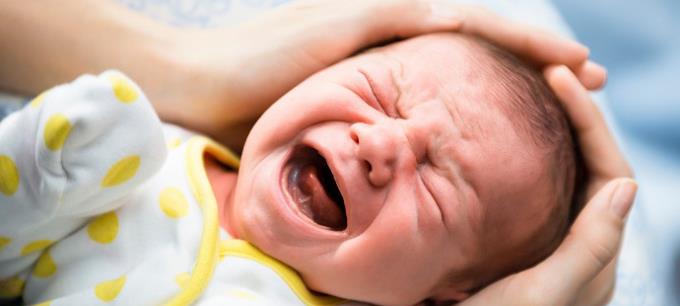Are you surprised to hear "addiction syndrome in babies"? No need to grow and be exposed to harmful chemicals, many babies are "addicted" from the time they are in the womb and last until the baby is born.
When a woman is pregnant and takes one of these medicines, the baby in the womb may become used to the medicine while in the uterus. At birth, the baby is still dependent on medication. When the drug is gone, the baby experiences symptoms of lack of medication, and this causes withdrawal syndrome in the newborn.

Irritability and poor feeding are common symptoms in "addicted" babies.
What medications can cause withdrawal symptoms in a newborn
Not only drugs, opioids or drugs, some drugs, including depressive drugs called selective serotonin reuptake inhibitors (SSRIs) are also responsible for the association. this in babies. So, experts recommend pregnant mothers should be especially careful when using any drugs during their pregnancy . In particular, mothers should note that the drugs have the following ingredients:
- Hypnotics
- Fentanyl
- Heroin and methadone
- Meperidine (Demerol)
- Morphine
- Pentazocine
- Propoxyphen
- Barbiturate
- Caffeine
- Chlordiazepoxide
- Cocaine
- Amphetamines
- Diazepam and lorazepam
- Diphenhydramine
- Ethanol
- Nicotine
- Phencycline
- SSRIs sertraline, citalopram)

It's dangerous to your baby if you drink alcohol during pregnancy You may have heard that alcohol has a negative effect on the health of your baby, but do you know the specific effects of alcohol on your baby while you are in the womb?
Common signs
“Struggling with lack of medicine” symptoms usually appear within the first 24 to 48 hours after birth, or may take 5-10 days to appear.
- Crying out loud, tight
- Fear of shivers
- Difficulty sleeping
- Muscle tension
- Seizures
- Increased startled reflexes
- Fever
- Sweating
- Shortness of breath
- Poor suckling, lack of coordination or excessive sucking
- Vomiting
- Stools liquid or diarrhea
Certain drugs cause specific problems, such as:
- Heroin-containing tranquilizers will cause "addiction" episodes to babies within 48 to 72 hours after birth. Methadone, commonly used to treat heroin addiction, has an effect similar to that of heroin. Methadone use during pregnancy also affects fetal growth restriction, increased risk of fetal failure, and increased risk of sudden infant death (SIDS) .
Exposure to marijuana during pregnancy can cause weak births, intracranial bleeding, restlessness, low blood sugar, low blood calcium, sepsis, and other problems such as poor appetite, irritability, and shortness of breath.
SSRIs are used to treat depression and other behavioral disorders. Babies exposed to SSRIs during the third trimester of pregnancy may experience various symptoms such as irritability, agitation, tremor, increased respiratory rate, nasal congestion, or diarrhea. These problems usually go away about two weeks after giving birth.

6 Signs of Baby Danger The first time you have a baby, you will have a lot of worries. Although it is not necessary to "panic" with any minor changes of the baby, the mother should not ignore it, especially for the following signs.
Treatment of addiction syndrome in newborns
In most cases, symptoms are mild and can be resolved within a week. However, there are also cases that last up to 3 weeks or more.
Swaddling and frequent, small meals with a high calorie content are common ways to manage this condition. In addition, in some cases, the doctor may prescribe medication for treatment. Usually, the drugs used will have a similar composition to the ones taken during pregnancy, but in lesser doses and will decrease over time.
Antiepileptic drugs, tranquilizers, can help control CNS symptoms and relieve irritation. However, it has little effect on gastrointestinal symptoms, weakens the baby's ability to suck, and it does not alleviate seizures caused by addiction.
The pain reliever, morphine, is a mild sedative that can help improve your baby's ability to suckle and increase nutrient intake. Morphine can also control seizures.
>>> See more discussions with related topics:
Taking care of babies: 12 things to avoid
Surprise about babies














